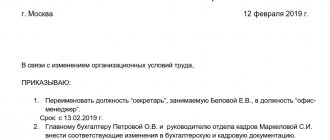• Registration • Making changes • Liquidation
The site uses government services:
Information required when filling out forms:
Information on the types of documents proving the identity of an individual
| Code | Title of the document |
| 03 | Birth certificate |
| 07 | Military ID |
| 08 | Temporary certificate issued in lieu of a military ID |
| 10 | Foreign citizen's passport |
| 11 | Certificate of consideration of an application for recognition of a person as a refugee on the territory of the Russian Federation on its merits |
| 12 | Residence permit in the Russian Federation |
| 13 | Refugee ID |
| 15 | Temporary residence permit in the Russian Federation |
| 18 | Certificate of temporary asylum on the territory of the Russian Federation |
| 21 | Passport of a citizen of the Russian Federation |
| 23 | Birth certificate issued by an authorized body of a foreign state |
| 24 | Identity card of a military personnel of the Russian Federation |
Related sections:
- Requirements for the preparation of documents submitted to the registration authority
- Codes of subjects of the Russian Federation (Appendix No. 1 to the Requirements for the preparation of documents submitted to the registration authority)
- Abbreviations for the names of addressable objects (Appendix No. 2 to the Requirements for the preparation of documents submitted to the registration authority)
Leave your comments and suggestions for improving this article in the comments.
To simplify information processing, there are various encodings used in a variety of reports, certificates, declarations and similar documentation. Despite the fact that the instructions for filling out these documents indicate all the necessary codes, taxpayers are still confused and do not know where to get the information. In this article we will tell you where to find the document type code “Russian passport” for the tax office, and we will show you how and where to enter it..
This indicator determines the type of document; The passport code for the tax office is very easy to find out from the reference information posted on the official website of the Federal Tax Service of the Russian Federation. The passport of a citizen of the Russian Federation is coded with the number 21.
The Federal Tax Service will be able to accept more documents electronically
Orders of the Federal Tax Service of Russia dated March 24, 2016 No. MMV-7-15/ [email protected] and dated April 13, 2016 No. MMV-7-15/ [email protected] approved new formats for invoices with expanded details and adjustment invoices with expanded details. details.
The format for submitting a document on the transfer of goods during trade operations in electronic form and the format for submitting a document on transfer of work results (a document on the provision of services) in electronic form have also been approved (Orders of the Federal Tax Service of Russia dated November 30, 2015 No. ММВ-7-10 / [email protected] and dated November 30, 2015 No. ММВ-7-10/ [email protected] ).
Despite the approval of these formats, organizations could not send them to the tax authority due to the lack of codes. This problem will be resolved soon.
In a letter dated July 29, 2016 No. AS-4-15/13968, the Federal Tax Service of Russia reports that work is currently underway to amend the Order of the Federal Tax Service of Russia dated June 29, 2012 No. ММВ-7-6/ [email protected] “On approval of the format of the inventory of documents sent to the tax authority electronically via telecommunication channels” and assigning codes to documents.
In particular, the documents will be assigned the following codes: 2937 - Document on the transfer of goods during trade operations; 2939 — Document on the transfer of work results (on the provision of services); 2441 - Invoice and document on the transfer of goods (work, services), property rights, including an invoice; 2943 — Adjustment invoice and document on changes in the cost of shipped goods (works, services), property rights, which includes an adjustment invoice. Assigning codes will allow organizations to send these documents to the tax authority electronically.
Let us remind you that currently organizations can send 10 electronic documents to the Federal Tax Service, which are assigned codes:
- 0924 - Invoice;
- 0925 - Purchase book;
- 0926 - Sales book;
- 1004 — Journal of received and issued invoices;
- 2181 — Certificate of acceptance and delivery of works (services);
- 2232 ——Additional sheet of the Purchase Book;
- 2233 — Additional sheet of the Sales Book;
- 2234 — Consignment note (TORG-12);
- 2772 — Adjustment invoice;
- 8888 - Response to Request for Explanation.
Now there will be 14 such electronic documents.
Full list of codes
As a general reference, here is a complete list of current values. Data may be required when filling out various forms - after all, there may be different life circumstances.
Name of identity card
Birth certificate
A certificate that is issued temporarily instead of a military ID
Passport of a citizen of a foreign country
Certificate received to confirm the fact that a citizen’s application for recognition as a refugee is under consideration on its merits
Resident card
Already received and issued refugee certificate
Residence permit on the territory of the Russian Federation (temporary)
Certificate that a person has been granted asylum on the territory of the Russian Federation
Passport of a citizen of the Russian Federation
Birth certificate issued in a foreign country
When submitting reports and certificates to the Federal Tax Service, which require indicating the type of document identifying an individual, it becomes necessary to note the code of the type of the corresponding document. We will tell you in our consultation where to get these codes and what code for the type of document “Russian Federation Passport” for the tax office.
Scan images
First of all, you should select the type of document - depending on this, fields will appear in which you will need to specify information. However, in any case, you will need to fill out the column “Item tr.” (requirement point) - it is highlighted in the following image:
Editing a document as a scan
In the section "Item tr." you should indicate the number of the item under which the downloaded document is indicated in the request. number format is 1.XX or 2.XX. In this case, “1” is indicated when sending a document that is specified in the request, and “2” is indicated when sending information (not a specific document) that is requested in it. XX is the serial two-digit document number.
Multi-page documents must be joined by clicking the appropriate button. If the document contains extra pages, then you need to click the “Split” .
When the file is ready, it's time to move on to the next one ( Next Document ). You can also return to the list of downloaded files by clicking the cross in the upper right corner or clicking on the gray background.
Grounds for forced collection of taxes from the debtor
Every taxpayer - be it an organization, individual entrepreneur or individual - is obliged to pay taxes to the budget in accordance with the Tax Code of the Russian Federation and do it independently. As a rule, payers also calculate the amount of taxes (with some exceptions) independently. But, for example, transport, land and property taxes for individuals are calculated by the tax authorities.
If the taxpayer has not paid the tax within the period established by law, the Federal Tax Service has the right to take measures to forcibly collect it from the budget. This right is given by the Tax Code of the Russian Federation.
The tax office generally collects taxes using the following algorithm:
When inspection requirements are illegal
Situation one: The request does not indicate within the framework of which tax control measures the documents were requested.
At first glance, such a drawback may seem formal, but an analysis of the norms of the Tax Code of the Russian Federation and judicial practice suggests the opposite.
- Firstly, the obligation of the inspectorate to indicate in the request the tax control event during which the documents were requested is determined by the provisions of paragraph 3 of Art. 93.1 Tax Code of the Russian Federation.
- Secondly, the very form of such a requirement requires the presence of this information (Appendix No. 15 to the Order of the Federal Tax Service of Russia dated May 8, 2015 No. ММВ-7-2 / [email protected] ).
Accordingly, a requirement in which this information is missing does not comply with the provisions of the Tax Code of the Russian Federation, and is also drawn up in violation of the established form, that is, we are talking about an illegal request for documents as part of a tax audit.
If the documents were requested on the basis of clause 1 of Art. 93.1 of the Tax Code of the Russian Federation, then the chances that the court will recognize the demand as illegal are very high.
This is explained by the following: The Plenum of the Supreme Arbitration Court of the Russian Federation, in paragraph 27 of Resolution No. 57 of July 3, 2013, noted: it is possible to request documents from counterparties and other persons who have documents about the taxpayer being inspected only during the period of an audit or additional tax control measures.
If the request does not contain information about the tax control event, you are deprived of the opportunity to find out whether the tax authority currently has the legal right to request documents from you.
At the same time, the content of the request must clearly indicate that the obligation to submit documents is legally assigned to you. In the case under consideration, the content of the requirement does not allow us to verify the legality of assigning this responsibility to you.
However, tax authorities more often indicate clause 2 of Art. as a basis for requesting documents. 93.1 Tax Code of the Russian Federation.
In this case, the question of the legality of the claim is more controversial. However, as practice shows, in most cases the courts side with the taxpayer.
The tax authorities believe that, in accordance with paragraph 2 of Art. 93.1 of the Tax Code of the Russian Federation, the request for documents is an independent tax control measure. Therefore, there is no need to additionally indicate this information in the request.
However, the courts do not recognize the demand for documents on the basis of paragraph 2 of Art. 93.1 of the Tax Code of the Russian Federation is an independent measure of tax control.
As a rule, they agree that the inspection is obliged to indicate within the framework of which tax control measures the documents were requested. Otherwise, the inspection requirement is illegal (Resolution of the Arbitration Court of the West Siberian District dated June 13, 2021 No. F 04-1488/2017 in case No. A 27-12323/2016, Resolution of the Arbitration Court of the Volga District dated December 23, 2021 No. F 06 -16020/2016 in case No. A 65-12057/2016).
At the same time, some courts, unfortunately, take a more superficial approach.
For example, the Arbitration Court of the North-Western District, in its Resolution No. F 07-2225/2018 dated March 19, 2021, indicated that this deficiency in the formalization of the claim is of a formal nature. It does not suppress the powers of the inspection provided for in paragraph 2 of Art. 93.1 Tax Code of the Russian Federation.
However, despite the ambiguity of judicial practice, if the requirement to submit documents on the basis of clause 2 of Art. 93.1 of the Tax Code of the Russian Federation does not indicate a specific tax control measure, this can become a serious argument in your favor.
To do this, you need to provide the following arguments:
- the need to indicate tax control measures in the request follows from the provisions of paragraph 3 of Art. 93.1 of the Tax Code of the Russian Federation and Order of the Federal Tax Service of Russia dated May 8, 2015 No. ММВ-7-2/ [email protected] ;
- the taxpayer must know that the obligation to submit documents is legally assigned to him, namely, that documents are not requested arbitrarily, but as part of a specific tax control exercise. In particular, the Federal Tax Service of Russia warns about the inadmissibility of arbitrary demand for documents (Letter dated June 27, 2021 No. ED-4-2 / [email protected] ).
Situation two: The request does not contain information about a specific transaction.
As mentioned earlier, tax authorities have the right to request documents on a specific transaction outside of the audit (Clause 2 of Article 93.1 of the Tax Code of the Russian Federation).
At the same time, a situation often arises when, as part of such a requirement, documents are requested not about a specific transaction, but about the financial and economic activities of the organization in general, for example, accounting policies, staffing, accounting documents, etc.
The courts believe that such requirements violate the rights and legitimate interests of taxpayers and recognize them as illegal (see, for example, Resolution of the Arbitration Court of the Volga District dated December 23, 2021 No. F 06-16020/2016 in case No. A 65-12057/2016).
It happens that it is not clear from the requirement which transaction and which counterparty the requested documents relate to. If it is not possible to identify a specific transaction, then this also indicates the illegality of the demand.
Judicial practice in this matter is clear and completely on the side of the taxpayer (Resolution of the Arbitration Court of the Far Eastern District dated March 21, 2021 No. F 03-712/2017 in case No. A 51-14515/2016, Resolution of the Arbitration Court of the West Siberian District dated February 3, 2021 year No. F 04-7101/2017 in case No. A 75-6717/2016).
In addition, the inspection does not have the right to indicate a specific counterparty in its request and oblige you to provide documents on all transactions with it. In any case, the request must contain information allowing the identification of a specific transaction. The courts support this conclusion as well.
For example, in case No. A 14-14883/2015, the Arbitration Court of the Central District considered a situation where the inspectorate requested from an organization documents on all its transactions with the same counterparty over a three-year period. The court declared such a requirement illegal, pointing out that the inspection went beyond the powers granted to it by Art. 93.1 of the Tax Code of the Russian Federation (see Resolution of the Arbitration Court of the Central District dated April 24, 2021 No. F 10-980/2017 in case No. A 14-14883/2015).
Requirements under “counter checks”.
The list of documents that can be requested directly from the taxpayer is limited within the framework of desk audits (Article 88 of the Tax Code of the Russian Federation). Basically, these are documents confirming the right to apply benefits or the legality of a refund or VAT refund.
However, these restrictions can be easily overcome by the inspector.
If documents related to the taxpayer’s activities cannot be requested during a desk audit from the taxpayer himself, then why not request the documents the inspector is interested in as part of a “counter” audit of each of the taxpayer’s counterparties. It turns out that the inspector is asking for documents not regarding the taxpayer himself, but the documents he has regarding all his counterparties. In fact, it is the taxpayer himself who is being audited. Formally, such demands are legal and in the vast majority of cases it is not possible to challenge them in court.
An important nuance of counter verifications is that the documents and information requested during them must be related to the taxpayer being audited, that is, to your counterparty, in respect of whom the audit is being carried out.
This connection does not have to be direct.
In a situation where you are asked for documents regarding your relationship with your counterparty, but are being checked by a third party (whom you may not know), such a requirement will be legal if your counterparty is a link in the chain of suppliers (buyers) leading to the third party being checked face.
Or, for example, you may be asked to provide information on how you recorded a transaction with a counterparty in your accounting records. The connection of this information with the taxpayer being audited (your counterparty) is not obvious, but the courts recognize the request for such information as lawful.
As part of the on-site inspection, any documents may be requested.
Clause 12 of Article 89 of the Tax Code of the Russian Federation contains only one limitation: they must be related to the calculation and payment of taxes. In the Letter of the Federal Tax Service of Russia dated July 25, 2013 No. AS-4-2/13622 “On recommendations for conducting on-site tax audits,” the tax service describes what documents and information may be of interest to inspectors, but in little more detail:
«During a tax audit, officials of the tax authority check, analyze, compare and evaluate documents and information that are important for drawing conclusions about the correctness of calculation, withholding and payment (transfer) of taxes and fees, as well as for making an informed decision based on the results of the audit
».
There is no exhaustive list of such documents; accordingly, the volume and composition of the requested documents and information is virtually unlimited.
Documents used to conduct collection operations
To carry out the above collection operations, tax authorities use documents in approved forms. These forms were approved by order of the Federal Tax Service dated February 13, 2017 No. ММВ-7-8/179.
In September 2021, a new order of the Federal Tax Service was issued - dated August 14, 2020 No. ED-7-8/583, which introduces new forms of tax documents from 2021. It was published on September 14, 2020. The text of the order states that it begins to operate 6 months after its official publication.
Thus, tax authorities will apply new forms of demands and decisions from March 14, 2021 .
General procedure
You can send 2 types of documents to the tax authority:
- In the form of a scan . This way you can transfer any document by indicating its name in the appropriate field.
- In the form of xml files . In this way, a form is transmitted that is assigned a tax return code (TDC).
Regardless of the file type, the primary user procedure will be the same.
On the main page of the service, select the “New” , in it the “Requirements” and follow the link “All requirements” . From the downloaded list, you should select a requirement to which you need to attach documents.
A window will open with information about this requirement. In it you need to click the button “Upload and send documents” . This can only be done after a receipt confirming acceptance of the request has been sent to the tax authority.
Requirement to provide documents (information)
The next step is to select the method for adding documents. They can be downloaded from your computer (or dragged into the field that appears) or selected in Diadoc . The second method will be available only if counterparties use this system to exchange information and documents.
Uploading documents before sending to the Federal Tax Service
Next, a window will appear in which you will need to select the documents to download:
Uploading documents to Kontur.Extern
Scanned copies are uploaded in jpg, tif, pdf and other formats.
The system should now recognize the files and download them. The results will be reflected in the following window:
The service shows which documents have been downloaded
At the same stage, you can add files if they were not selected in the previous window. For this there is a button “More documents” .
If you download unnecessary files, you can delete them. For this purpose, there is an icon in the form of a basket, which appears when you hover the cursor over the line with the file.
Now the documents need to be edited. You should click on the link with the file name and it will be downloaded.
Requesting taxpayer documents as a tax control tool
The current tax legislation gives the tax authorities very extensive powers in the field of obtaining information about the economic activities of taxpayers; one of the main tax control measures used by tax inspectorates is the request for documents and information by sending relevant requests and instructions. We will highlight some aspects of the legal regulation of this type of powers of tax authorities in this article.
In accordance with Art. 31 of the Tax Code (Tax Code) of the Russian Federation, tax authorities have the right to demand, in accordance with the legislation on taxes and fees, from a taxpayer, fee payer or tax agent, documents in forms and (or) formats in electronic form established by state bodies and local government bodies, which serve as the basis for calculation and payment (withholding and transfer) of taxes, fees, as well as documents confirming the correctness of calculation and timely payment (withholding and transfer) of taxes, fees.
The Tax Code provides that documents can be requested as part of a tax audit : a tax official conducting a tax audit has the right to request from the person being audited the documents necessary for the audit (Article 93 of the Tax Code of the Russian Federation). Likewise, outside the framework of a tax audit: a tax official conducting a tax audit has the right to request these documents (information) from the counterparty or other persons who have documents (information) relating to the activities of the taxpayer being inspected (fee payer, tax agent). (Article 93.1 of the Tax Code of the Russian Federation).
Let's consider each of these options.
1.) Request for documents as part of a tax audit:
In accordance with Art. 93 of the Tax Code of the Russian Federation, the requirement to provide documents can only be sent by the person conducting the tax audit as part of this tax audit. In accordance with Art. 87 of the Tax Code of the Russian Federation, tax authorities conduct the following types of tax audits of taxpayers, fee payers and tax agents: 1) desk tax audits; 2) on-site tax audits.
In accordance with Art. 88 of the Tax Code of the Russian Federation, a desk tax audit is carried out by authorized officials of the tax authority in accordance with their official duties without any special decision of the head of the tax authority within three months from the date the taxpayer submits a tax return (calculation).
The Ministry of Finance of Russia in Letter dated April 15, 2010 N 03-02-08/24 reports that specified in paragraph 2 of Art. 88 of the Tax Code of the Russian Federation, the period for a desk audit is maximum. In addition, as noted in the Letter of the Ministry of Finance of Russia dated February 18, 2009 N 03-02-07/1-75, since the Tax Code of the Russian Federation does not provide for the extension of a desk tax audit, therefore, the maximum period for its implementation is set at three months from the date of submission to the tax authority tax return (calculation).
The Presidium of the Supreme Arbitration Court of the Russian Federation, in Resolution No. 10349/09 dated November 17, 2009 in case No. A40-53471/08-118-252, indicated that within the three-month period established for conducting a desk tax audit, the tax authority is obliged to carry out verification activities in relation to the tax authority adopted by it declarations.
Thus, tax legislation directly stipulates that the period of a desk tax audit is limited to three months from the moment the taxpayer submits the relevant declaration, during which control measures can be carried out (including requesting documents).
In accordance with Art. 89 of the Tax Code of the Russian Federation, an on-site tax audit is carried out on the territory (premises) of the taxpayer based on the decision of the head (deputy head) of the tax authority. An on-site tax audit cannot last more than two months . This period may be extended up to four months , and in exceptional cases - up to six months . During this time, tax officials must carry out all tax control activities.
Carrying out tax control activities outside the on-site audit period in some cases leads to the fact that the evidence obtained during these activities is considered unacceptable (clause 4 of Article 101 of the Tax Code of the Russian Federation). According to paragraphs. 11 clause 1 art. 21 of the Tax Code of the Russian Federation, taxpayers have the right not to comply with unlawful acts and demands of tax authorities, other authorized bodies and their officials that do not comply with the Tax Code of the Russian Federation or other federal laws.
Accordingly, requests for the provision of documents sent by tax authorities outside the period for conducting a desk or field tax audit, in the absence of a decision on additional tax control measures adopted in accordance with clause 6 of Art. 101 of the Tax Code of the Russian Federation are illegal.
Clause 7 of Art. 88 of the Tax Code of the Russian Federation provides that when conducting a desk audit, the tax authority does not have the right to request additional information and documents from the taxpayer, unless otherwise provided by this article of the Code or if the submission of such documents along with the tax return is not provided for by the Code. Thus, when conducting a desk audit, the tax authority has the right to request additional information and documents from the taxpayer only in the cases provided for in Art. 88 Tax Code.
The list of such cases is established by paragraphs 6, 8, 9, 11 of Art. 88 Tax Code of the Russian Federation:
- documents confirming the right of taxpayers to tax benefits
- documents confirming, in accordance with Article 172 of the Tax Code of the Russian Federation, the legality of applying tax deductions.
- documents that serve as the basis for the calculation and payment of taxes related to the use of natural resources
- when conducting a desk tax audit of the tax return (calculation) for corporate income tax, personal income tax of a participant in an investment partnership agreement, information about the period of his participation in such an agreement, about his share of the profits (expenses, losses) of the investment partnership.
- when conducting a desk tax audit on a consolidated group of taxpayers
According to paragraph 12 of Art. 89 of the Tax Code of the Russian Federation, when conducting an on-site tax audit, the taxpayer may be required to submit the documents necessary for the audit in the manner prescribed by Art. 93 Tax Code of the Russian Federation. In accordance with Art. 93 of the Tax Code of the Russian Federation, the requirement to submit documents can be transferred to the head (legal or authorized representative) of an organization or an individual (his legal or authorized representative) personally against signature or transmitted electronically via telecommunication channels. If the request for the submission of documents cannot be transmitted using the specified methods, it is sent by registered mail and is considered received after six days from the date of sending the registered letter.
Documents that were requested during a tax audit are submitted within 10 days (20 days for a tax audit of a consolidated group of taxpayers) from the date of receipt of the corresponding request.
If the taxpayer does not submit the requested documents, or does not submit them within the established time limits, then this is recognized as a tax offense, which entails liability under Art. 126 of the Tax Code of the Russian Federation (two hundred rubles for each document not submitted). In addition, in this case, the tax official conducting the tax audit has the right to seize the necessary documents in the manner prescribed by Art. 94 of the Tax Code of the Russian Federation (clause 4 of Article 93 of the Tax Code of the Russian Federation).
During a tax audit or other tax control activities, tax authorities do not have the right to request from the person being inspected documents that were previously submitted to the tax authorities during desk or field tax audits of the person being inspected. This restriction does not apply to cases where documents were previously submitted to the tax authority in the form of originals, which were subsequently returned to the person being inspected, as well as to cases where documents submitted to the tax authority were lost due to force majeure (clause 5 of Article 93 of the Tax Code of the Russian Federation ).
2.) Request for documents outside the scope of a tax audit
If a tax audit is not carried out, but the tax authorities need to obtain information regarding a specific transaction, then the tax authority official has the right to request this information from the participants in this transaction or from other persons who have information about this transaction.
Based on Art. 93.1 of the Tax Code of the Russian Federation, tax authorities may request any previously unsubmitted documents regarding a specific transaction. List of documents that the tax authority has the right to request in accordance with Art. 93.1 of the Tax Code of the Russian Federation, is not limited by the legislator. At the same time, in Art. 93.1 of the Tax Code of the Russian Federation there are no restrictions on obtaining information outside of verification and for the period to which this information relates.
In paragraph 3 of Art. 93.1 of the Tax Code of the Russian Federation establishes that the tax authority carrying out tax audits or other tax control activities sends a written order to request documents (information) relating to the activities of the taxpayer being inspected (fee payer, tax agent) to the tax authority at the place of registration of the person who the specified documents (information) must be requested.
At the same time, the order indicates during which tax control event the need to submit documents (information) arose. And when requesting information regarding a specific transaction, information that allows it to be identified is also indicated.
Judicial practice proceeds from the fact that in this case it is mandatory to indicate in the order to request documents (information) to obtain information on a specific transaction information that makes it possible to identify this transaction. If the requirement to provide documents (information) does not contain indications of a specific transaction regarding which information is requested, such a requirement is illegal. (Resolution of the Federal Antimonopoly Service of the North-Western District dated March 10, 2010 N A56-41688/2009, Determination of the Supreme Arbitration Court of the Russian Federation dated June 11, 2010 N VAS-7438/10).
Requesting documents is an extremely important power of the tax authorities and one of the most effective tax control measures, both in terms of frequency of use and in terms of obtaining the information necessary for the tax authorities. Taxpayers should approach the issue of providing documents to tax authorities with special attention, since the requirements of tax authorities are not always legal and enforceable.
What changes have been made since 2021?
The adjustments are not of any drastic nature. Let's look at some of them:
- UIN details have been entered into the tax payment requirement for organizations and a table has been added with the details by which payment should be made;
- in the payment request for individuals in the table, the details of KBK and OKTMO are replaced by UIN;
- In the decision to collect funds from a bank account, the wording of the text of the decision was slightly changed.
And other similar changes.
In addition, starting from 2021, new forms of Federal Tax Service documents have been added for tax purposes:
- requirement for the return to the budget of tax amounts (interest) received in excess by the taxpayer (credited to him) - Appendix No. 4;
- requirement for payment of a sum of money under a bank guarantee (guarantee agreement) – Appendix No. 5.





